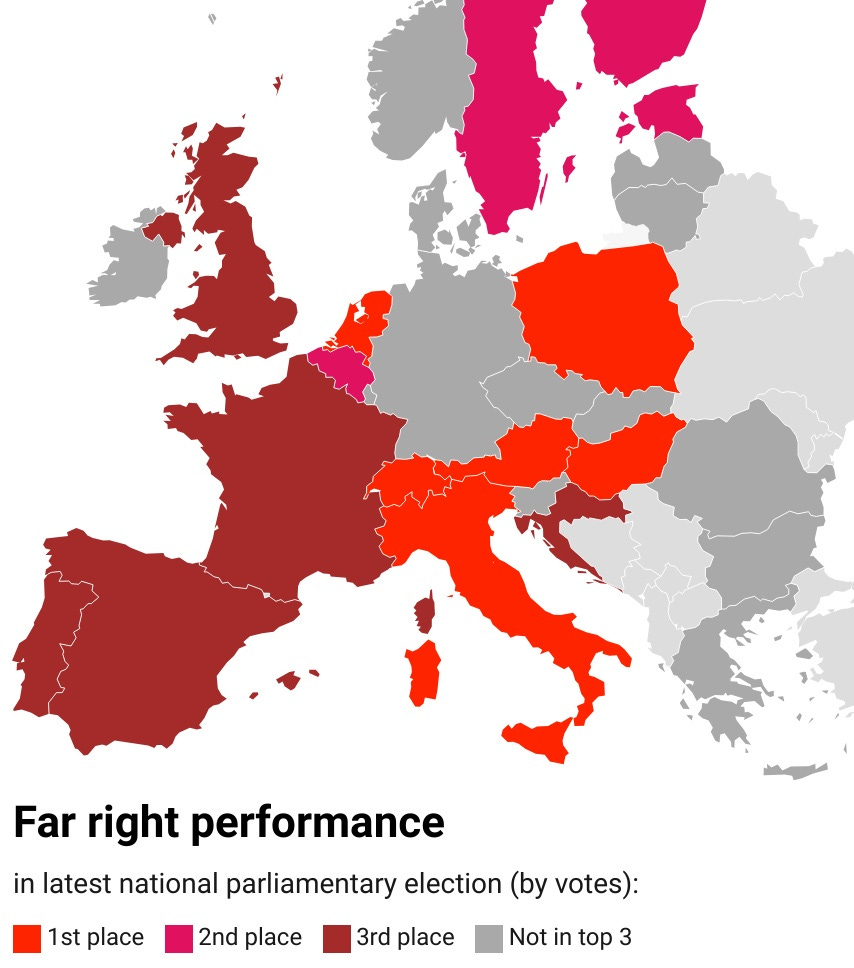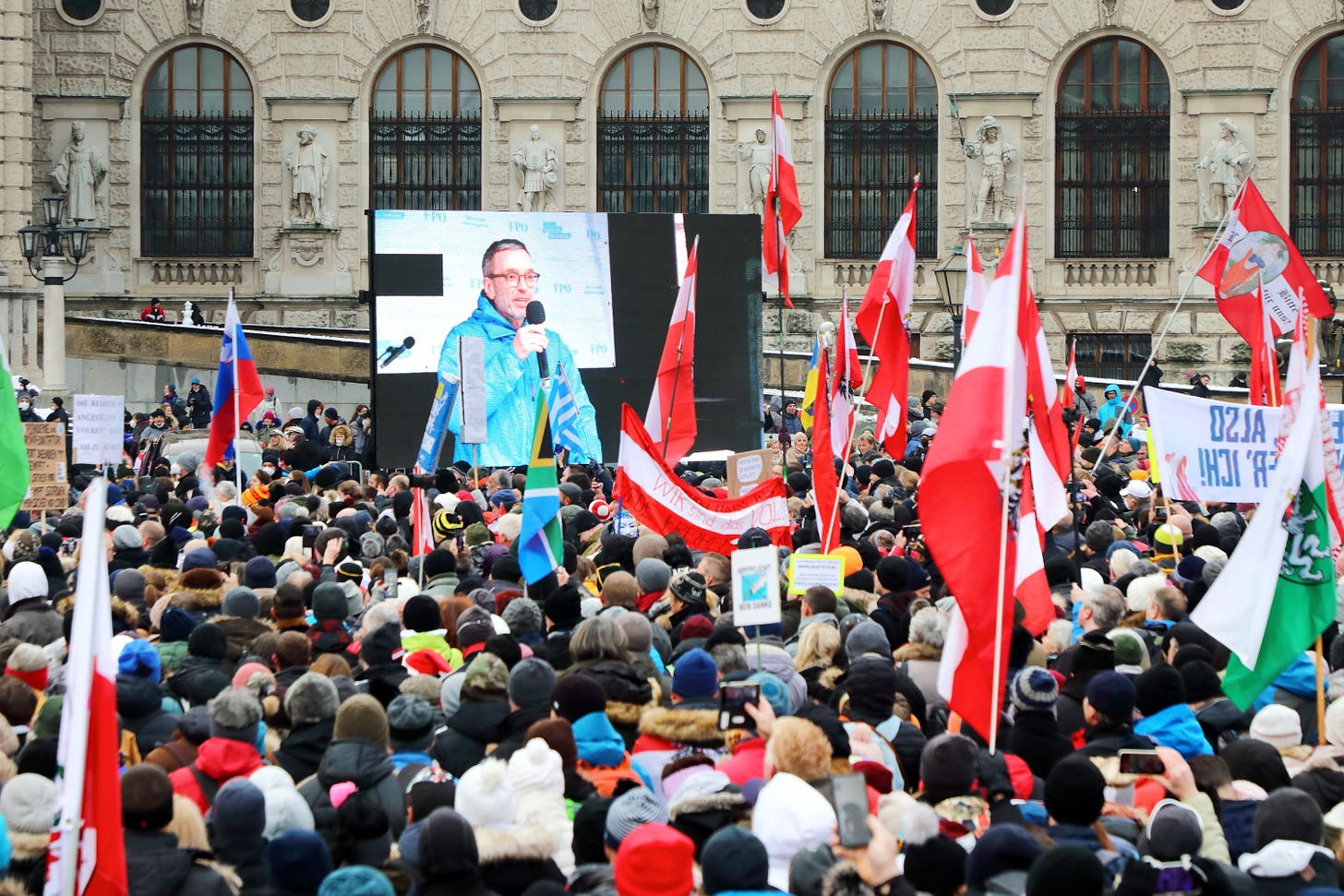Austria's far right win is both new and old news
The FPÖ, founded by Nazis after WW2, has been a big part of Austrian politics for decades. But their sudden thrust from 2nd to 1st place is part of a Europe-wide wave.
Brussels is waking up to familiar headlines this morning as yet another election in an EU country has put the far right in first place. The Freedom Party (FPÖ), founded after World War II by former Nazis, got 29.2% of the vote - almost three points higher than the ruling center-right Peoples Party (ÖVP) with 26.5%. In theory, that’s put the FPÖ firebrand leader Herbert Kickl, who has said he would rule as a “Volkskanzler” (a term previously used by Adolph Hitler) in position to become Austria’s next leader.
On one hand this is nothing so new for Austria, a country which never went through the denazification process like West Germany where the far right has been a powerful force for decades. This result is only slightly higher than the 27% scored by the FPÖ in 1999, when they came second place. That wasn’t a fluke. They got 26% in 2017. The FPÖ has been in the government before, in coalition with the ÖVP which stood out among center-right EPP members for already breaking the cordon sanitaire decades ago. But what happened in 1999 could offer a clue on what comes next in 2024. Back then, the ÖVP said it would only form a governing coalition with FPÖ if its controversial leader Jörg Haider step aside, which he subsequently did.
The difference now of course is that the situation is reversed from 1999 and 2017, because FPÖ is in first place while ÖVP is in second place. That may be based on the whims of 100,000 voters, but it makes a big difference in terms of who has the legitimacy to form a government. Austria could go the Italian route, the Dutch route, or the Polish route. In Italy Giorgia Meloni was made prime minister in a coalition after her far-right party came first in 2022. In the Netherlands, Geert Wilders was specifically excluded from becoming the Dutch prime minister as the price for forming a coalition after his far-right party came first in 2023. It is much more likely that Austria goes the latter route, or that ÖVP spurns FPÖ entirely and instead forms a ‘grand coalition’ with the center-left Social Democrats, who got 21%. That would be the Polish route, where last year PiS still came first in the 2023 election but Donald Tusk’s center-right civic platform was still able to keep them out of government by forming a coalition with the center-left.
But even though it’s nothing new that the far right does well in an Austrian election, it is impossible not to see this as part of the wider phenomenon of the moment with far right parties surging across Europe with an anti-migration message. FPÖ is closely aligned with Hungary’s Viktor Orban, particularly in their message that Ukraine should make peace with Russia and cede territory, as Donald Trump has suggested he will make happen if he is elected in November. They are aligned with Orban and France’s Marine Le Pen at European level, forming the Patriots for Europe group in the EU Parliament. And it was clear from the reaction around Europe last night that Europe’s far right sees this win as part of a pan-European movement.
"After the Italian, Dutch and French elections, this tidal wave which supports the defence of national interests, the safeguarding of identities and the resurrection of sovereignties confirms the triumph of the people everywhere," declared Le Pen. "The FPÖ victory isn't just a victory for Austria - it extends far beyond the borders of the Alpine republic and is a good sign of progress for Europe,” said Bjoern Hoecke, one of the leaders of Alternative for Germany. Geert Wilders said, “We are winning! Times are changing!” Italy’s Deputy Prime Minister Matteo Salvini called it, “a historic day in the name of change." And Hungary’s Foreign Minister Peter Szijjarto said, "After the Czech Republic, another victory for the Patriots across the border...No war, no migration and no gender propaganda!"
It is that geographic proximity that will have Brussels particularly worried. If the FPÖ is able to form a governing coalition, the EU could be looking at a ‘Habsburg bloc’ of countries governed by eurosceptic populist pro-Russian forces in Austria, Hungary, Slovakia and perhaps Czechia after an election there next year. In addition, it is no less alarming that Austria is the second EU country, after Italy, to have given the most votes to a party with direct ancestral links to WW2-era fascists.
Still, it’s important to keep things in perspective. Europe’s far right still remains divided and that will dent their impact at European level. Excluding Hungary which is a unique case (Orban’s Fidesz having formerly been in the center-right EPP until recently), they have not won an outright majority in any election in Europe. I would still maintain that Europe’s far right problem is nothing compared to America’s. Getting less than a third of the vote is very different from getting half the vote, and politically Europe’s far right looks downright tame in comparison to Donald Trump and the MAGA movement.
But, ahead of the US election in November, the far-right seeds have been well and truly planted in Europe. If Trump takes power, those seeds will be activated and quickly sprout. Giorgia Meloni has played the role of the pro-Ukraine moderate while Joe Biden has been in power. But she has professed admiration for Trump in the past and, particularly if she listens to the others in her own far-right Brothers of Italy party, there is every reason to expect that she will suddenly become a very different person with Trump in the White House.
Europe has allowed itself to become a dependency of the United States, and that means it is inevitably bound to the political developments of its protector. If Trump takes power it seems quite likely that not only will Europe’s far right be emboldened as part of a larger transatlantic power ascendancy, but Europe’s center right will enter into hyperdrive in normalizing and accepting them. Before long the difference between the center right and the far right could be indistinguishable. That would happen because the center has moved to the right - not vice versa as so many people want to use the Meloni example to delude themselves with.
A Trump loss (both at the ballot box and then in the inevitable coup attempt that will follow) would deflate the air out of the tires of Europe’s far right. It wouldn’t stop them in their tracks, but the momentum would be slowed. The alternative right now is almost too scary to think about.






